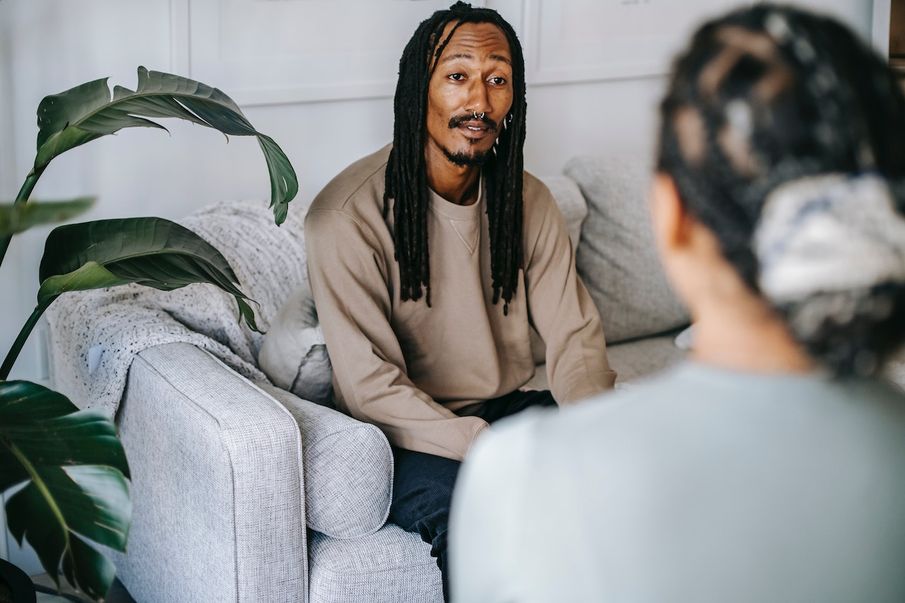Exploring new methods of caring for your mental wellbeing can be daunting, especially if you don’t know what to expect. But, here, Fiona Fletcher Reid shares six valuable insights from her experience of entering the therapy room that could make all the difference in your own journey
To say that therapy has changed my life would be an understatement. Having a private space to talk honestly about my emotions has uncovered some huge realisations (and painful truths) about myself that I’m certain I wouldn’t have been able to access safely on my own. Some people say their only regret is that they wish they’d started therapy sooner, but I believe I found therapy when I was ready to do the inner work.
Making that leap from being curious about therapy to booking your first appointment is a biggie, because it’s unknown territory that involves making yourself emotionally vulnerable. Your experience will be unique to you, however, through talking to friends, I’ve found that there are a lot of commonalities between the things that people tend to struggle with, especially in the early days. So, here are six things I’d wish I’d known about therapy, that could help you, too.
1. One bad experience doesn’t mean therapy isn’t for you.
Finding the right therapist is a bit like online dating. You swipe through pages of potential candidates, read hundreds of bios, create a shortlist of the people who fit the bill, and then you come across ‘the one’. You like their smile, they’re affordable, and local. What’s not to like? But when you get chatting in real life there’s just… no spark. The important thing to remember here is that your first therapy experience does not define how successful therapy could be for you overall. Go back to your shortlist and talk to other therapists until you meet someone who you feel comfortable with, and take it from there.
Jo Hooper, freedom coach at getwildlyfree.co.uk says, “I wish I’d known early on how important it is to have a connection with your therapist. Like any relationship, you just vibe with some people more than others, and if the vibe isn’t there then it’s probably not going to work.”
2. Be patient and allow for tangents.
Opening up about emotions is a daunting task, especially with someone you don’t know very well. If you don’t feel ready to talk about something then don’t do it. You’ll know when the time is right. Perhaps you start working with a therapist to manage your stress levels at work, but as the sessions progress and you build trust with each other, you find yourself wanting to talk about past relationships instead. Follow your intuition and discuss what’s on your mind on the day – after all, our lives can’t always be categorised into boxes and dealt with systematically.

3. You don’t have to agree to weekly sessions.
Unless your therapy is provided by the NHS, health insurance, or your employer, the biggest hurdle to seeking support is often the financial burden of paying for a private therapist. With hourly rates ranging anywhere between £40 to £200, the fees soon mount up when you have weekly appointments.
After trialling weekly sessions with my therapist, I found that the cost combined with the emotional recovery time required after each session became overwhelming. Remember, this is your treatment, and you can work with your therapist to ensure it meets your specific needs. You might find that fortnightly or even monthly sessions are more effective in the long run, so don’t be afraid to suggest this to your therapist. If you’re nervous, try asking over email first.
4. The emotional hangover is real.
It’s normal to feel tired when you’re stressed, and during therapy, you’re actively bringing up subjects that increase stress levels and, therefore, can lead to exhaustion. It’s common to be floored with physical and mental fatigue post-therapy, and although it doesn’t happen after every session, you should allow yourself time to recover in the hours that follow. Schedule some self-care, such as a walk in the park, a nap, or listening to some soothing music. Be patient with yourself and prioritise rest, and you’ll likely find that, over time, you need less and less recovery time.
5. Growth happens outside of therapy.
Although talking to a professional may be therapeutic in and of itself, the long-lasting results come from doing the work outside of your sessions. What that work looks like will differ based on your circumstances and your therapist’s approach. You might be given worksheets to fill out, practical exercises, or encouraged to have an honest conversation with someone in your life. Sometimes the integration of what you’ve spoken about during therapy clicks into place a few days, weeks, or even months after the initial appointment, so don’t be surprised if you find yourself having an emotional breakthrough on a random afternoon in the park.

Hannah Ross, tarot reader at Goddess Tarot Society, says she wishes she’d known that therapists can’t do the work for you. “I logically knew it would be me doing the work, however, I don’t think I fully understood this before I started. There was a hope my therapist would tell me what I should fix, and that wasn’t the case.”
6. It’s OK to take a break from therapy.
There is a lot of pressure nowadays to always be working on yourself, to always be growing, and healing at a rapid rate. The truth is that sometimes you need a rest from healing, because it’s so exhausting. If you’re paying for your therapy then it might be that you need to take a break to save money. Whatever the reason, taking a break from therapy doesn’t mean you’ve given up. It’s all just part of the process.
Fiona Fletcher Reid is a freelance writer and author, whose new book, ‘Work It Out’, is available now (Welbeck Balance, £9.99). Visit fionalikestoblog.com for more.


Comments